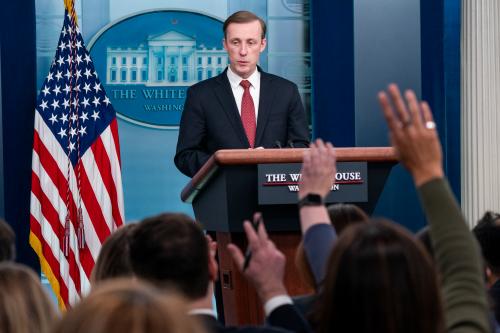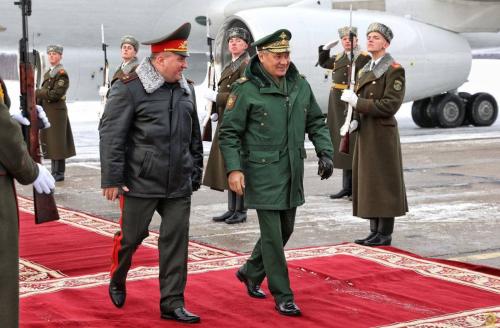Let’s be clear at the outset: Edward Snowden betrayed his country and his country’s trust. A genuine whistle-blower concerned that the National Security Agency (NSA) was overstepping its bounds would have found a path other than that chosen by Snowden, whose revelations go well beyond exposing NSA monitoring of e-mail and phone communications of American citizens. By many accounts, he has done untold damage to U.S. national security.
That said, the affair has generated an unexpected amount of irony, hyperbole and outright silliness since Snowden arrived at Sheremetyevo Airport in Moscow eight days ago.
Let’s start in Moscow. The Russians appear undecided about what to do with Snowden. Some surely want to keep him in hopes of gaining access to what he knows. Others likely hope for an early departure, seeing his lingering presence as a distraction for U.S.-Russian relations. Russian President Vladimir Putin tried to position himself in the latter group last week when he said “the faster he (Snowden) chooses the final destination point, the better it will be for us and for him.”
The Kremlin has restrained itself; one can only imagine the spectacle of daily press conferences with Snowden in the Sheremetyevo transit lounge. Yet, if Mr. Putin really wanted Snowden out of Russia, one would think that Snowden would be … out of Russia. But on July 1, the Russian president allowed that Snowden could remain in Russia if he wished, provided that he stop harming “our U.S. partners.”
Other Russians appear to have embraced Snowden. One national television network praised him as “the man who declared war on Big Brother.” That’s a tad ironic, coming from the country that invented Big Brother. Meanwhile, the Federal Council (the upper house of Russia’s parliament) would like to have Snowden appear and address the question of NSA spying on Russian citizens. Has that body or its counterpart, the Federal Assembly (the lower house) ever shown the slightest interest in how Russian intelligence agencies monitor Russian citizens?
In Washington, one has to question the wisdom of senior U.S. officials, including the Secretary of State, so publicly demanding that the Russians arrest and return Snowden to the United States. Why stake out that position when we and the Russians know that the chances of Moscow responding favorably are zero? I would like to see Snowden brought to account before a U.S. court. But do not expect the Russians to help. From their perspective, he has broken no Russian laws and presumably has significant information regarding intelligence activities and capabilities that could be targeted against Russia—assuming that he has not already shared it with his Russian hosts.
By the middle of last week, the administration wisely had begun to tone down its public position. That earned President Obama a blast from the Wall Street Journal, which took him to task for not personally picking up the phone to call Putin in order to secure Snowden’s arrest. How does it possibly strengthen America’s diplomatic hand to have the president call and make that demand when we know with absolute certainty that the answer will be nyet? The only questions would be whether Putin delivered the nyet politely and how broadly he would be smirking when doing so.
To appreciate how bizarre this issue is becoming, imagine the following: Eduard Snegov, a former Russian intelligence officer, having publicly revealed information about Russian intelligence activities similar to that revealed by Snowden, turns up at Dulles International Airport’s transit lounge, and the Russian government demands his arrest and return to Moscow. Would the U.S. government do so? Not a chance.
Meanwhile, things degenerated into outright silliness on Capitol Hill. At least the silliness was bipartisan. Senator Robert Menendez (D-NJ) issued a statement to “call on the Russian government, in the interest of justice, as well as U.S.-Russian relations, to release him (Snowden) into the custody of the U.S. government today.” Senator Lindsey Graham (R-SC) also called on Moscow to return Snowden and later went on to warn, “I’m trying to put together a package to let the Russians know how serious we are… We have to respond, this is a defining moment in the relationship.” Others repeated those lines or variations thereof on the Sunday talk shows on June 30. Will Congress try to turn this affair into another reason to slap sanctions on Russia?
A question for those in Congress who demand that Moscow return Snowden to U.S. custody: In the imagined scenario above, what would happen if—against all odds—the U.S. government arrested Snegov and even pondered returning him to Russia? The administration would be savaged on the Hill, but again, at least in a bipartisan manner.
The U.S. government should of course look for ways to bring Snowden to justice. And it may well have leverage with some countries to make that happen. It would be better for U.S.-Russian relations, and for the prospect of securing Snowden’s arrest, were he to depart Moscow as soon as possible … perhaps to a country where there would be a chance of getting him back. But open and strident demands that Russia arrest and return him are tilting at a windmill and only make Washington look foolish.



Commentary
Edward Snowden in Moscow: Irony, Hyperbole and Silliness
July 1, 2013